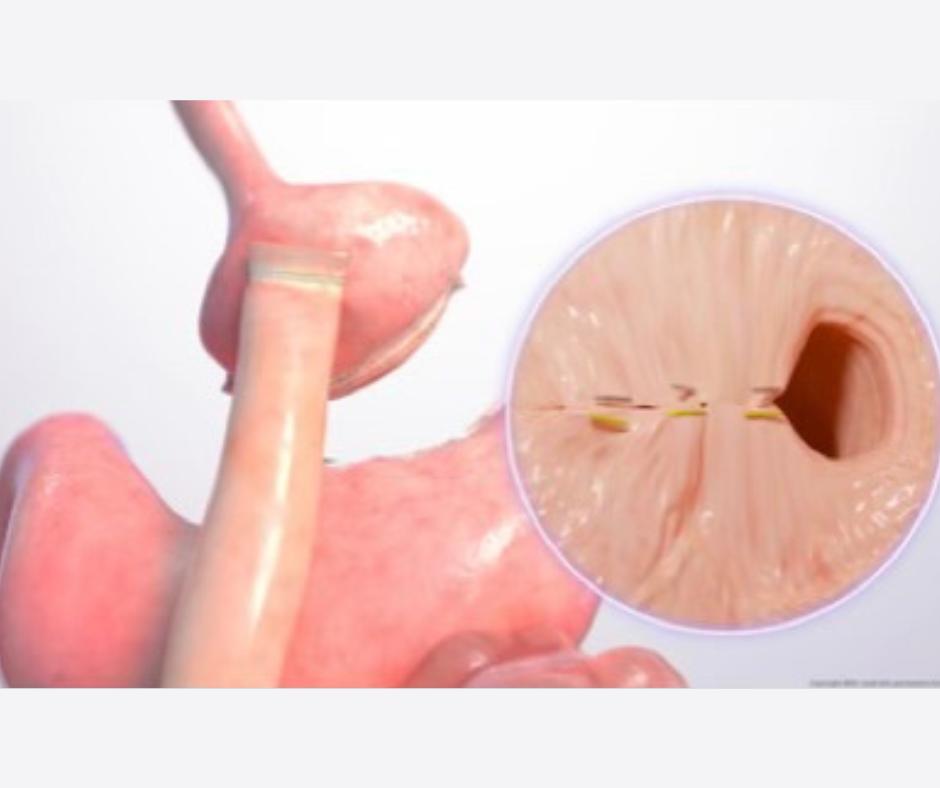Gastric Bypass Revision (Transoral Outlet Reduction) Explained
Gastric bypass is a surgery to lose weight that cuts off the food you eat from going into your stomach and then into your body. Over time, your pouch and its connection point to the intestine can get bigger. If they do, you will be able to eat larger portions and regain weight. Most people who have had gastric bypass surgery will eventually regain 30% of the weight they lost. But, more than 1 in 5 people will completely gain back all of their weight again.
Transoral Outlet Reduction is a new procedure that makes the size of your stomach smaller. This means you will feel full again and will be able to lose weight. It is a non-surgical procedure and most people can go back to work in 2-3 days.
View Study: Five-year outcomes of transoral outlet reduction

Who is it For?
Transoral Outlet Reduction is best for people who had gastric bypass more than two years ago and lost weight. But they have since gained it back and can eat larger portions. The people will benefit the most from this are those willing to change their lifestyle to keep the weight off.
How The Procedure Works
This is a 30-45 minute, non-surgical, incisionless procedure. Your doctor will use a device mounted to a flexible endoscope that goes into your stomach through your mouth. Using this tool, your stomach will be tightened and fixed. Your pouch will be smaller or the same size as before.
How Much Weight Will I Lose?
The average weight loss with an Transoral Outlet Reduction is 10%-15%. This is less than the gastric bypass. But it does not have the same complications as before. Studies show that people lose weight and keep it off for five years or more after this procedure.
Why Choose Us For TORe?
Endoscopic Mastery
The complicated nature of endoscopic procedures demand a great amount of skill. Dr. Veera is a gastroenterologist with an expertise in weight loss and endoscopies. He travels all over to learn the lastest cutting edge procedures so that he can bring most advanced care to Upsate South Carolina.
Bariatric Prestige
Dr. Veera is a renowned gastroenterologist who performs endoscopic procedures at Anmed Hospital. AnMed Health Weight Loss Surgery was certified in 2016 by the Metabolic and Bariatric Surgery Accreditation and Quality Improvement Program (MBSAQIP), a nationally accredited program that meets the highest standards for patient safety and quality of care. The MBSAQIP standards ensure that weight loss surgery patients receive a multidisciplinary program, not just surgery, which improves long-term success.
Physician Commitment
If you live in South Carolina, or are traveling from another state, we promise to provide the highest level of concierge care with direct access to your physician. We remain committed for your success throughout this weight loss journey because our goal is not just about losing pounds but also regaining health and happiness.
Pricing Plans (Cash Pay Only)
$11,200
Insurance does not currently provide coverage for non-surgical weight loss procedures
FAQ:
Transoral Outlet Reduction is a non-invasive technique used to restore your gastric bypass surgery to its original, or smaller size. Beginning several years after the surgery, it may be enlarged and less restrictive than before. Endoscopic bariatric revision tightens up both the Outlet (connection between pouch & small intestine) as well as tightening of the Pouch for more restriction, helping people lose weight they regained since their first operation
This procedure is designed for patients who have had a gastric bypass procedure and are now experiencing weight regain and a reduced feeling of fullness after eating.
Bariatric revision surgery is only for those who have had prior gastric bypass surgery. If you regained weight after gastric bypass surgery for reasons other than dilatation of your pouch or outlet, then bariatric revision may not be an option. If you are a smoker or suffer from ulcers or complications due to your original surgery, then bariatric revision may not work well with you either
Non-Surgical Endoscopic Procedure Comparisons

ESG

ORBERA
ORBERA

TORe

LSG (Do Not Offer)
Type of Procedure
Non Surgical (Endoscopic)
Non Surgical (Endoscopic)
Non Surgical (Endoscopic)
Surgical
Is Hospitalization Required
No
No
No
Yes; 1-3 days
Return to work
2-3 days
2-3 days
2 days
1-2 weeks
Average Excess Weight Loss
50 %
30-40 %
50-60 %
60-70 %
Average Total Body Weight Loss
20 %
15 - 20 %
25 %
20-30%
Major Complications
Rare <1%
Rare <1%
Rare <1%
2-6 % (0.11% mortality)
Reversible
No
No
Yes
No
Covered by insurance
No
No
No
Yes (if eligible)
